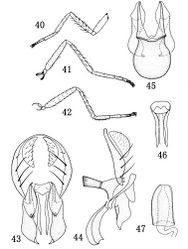Difference between revisions of "Rhynchopsilopa shixingensis"
m (Imported from ZooKeys) |
m (1 revision) |
(No difference)
| |
Latest revision as of 17:20, 21 August 2012
| Notice: | This page is derived from the original publication listed below, whose author(s) should always be credited. Further contributors may edit and improve the content of this page and, consequently, need to be credited as well (see page history). Any assessment of factual correctness requires a careful review of the original article as well as of subsequent contributions.
If you are uncertain whether your planned contribution is correct or not, we suggest that you use the associated discussion page instead of editing the page directly. This page should be cited as follows (rationale):
Citation formats to copy and paste
BibTeX: @article{Zhang2012ZooKeys216, RIS/ Endnote: TY - JOUR Wikipedia/ Citizendium: <ref name="Zhang2012ZooKeys216">{{Citation See also the citation download page at the journal. |
Ordo: Diptera
Familia: Ephydridae
Genus: Rhynchopsilopa
Name
Rhynchopsilopa shixingensis Zhang & Yang & Mathis, 2012 sp. n. – Wikispecies link – ZooBank link – Pensoft Profile
Diagnosis
Body shiny black, with blue reflections. Face reddish brown; palpus yellow, not stout at apex; arista with 8–9 dorsal rays. 1 pair of posts dc, sutural dc absent. Forecoxa yellow, with brown extreme base, mid and hind coxae brownish yellow; femora and tibiae yellow; foretarsomere 5 brown, mid and hind tarsomeres 4 and 5 brown, other yellow. Forefemur with rows of strong pd and pv, longer than width of forefemur. Mesonotum and abdomen with short and sparse setulae. Costal vein index 0.45, M vein index 2.3. Male genitalia: epandrium narrow; hypandrium large, round in ventral view; postsurstylus broadened at apex, but pointed at extreme apex, gonite/subepandrial plate slender at base; phallapodeme with process at base in lateral view.
Description
Male body length: 1.9–2.1 mm; wing length: 2.4–2.6 mm.
Head shiny black, with blue reflections. Setulae and setae of head black. Lateral vt as long as medial vt; 1 pair of strong oc; 1 pair of proclinate orb. Face reddish brown; epistoma and palpus yellow, the latter stout at apex. Gena with 1 strong seta. Arista with 8–9 dorsal rays.
Thorax shiny black, with blue reflections; mesonotum with short and sparse setulae. Thoracic setulae and setae black. 1 pair of posts dc, sutural dc absent; 2 rows of weak and short acr, posterior npl as long as anterior npl; katepisternal seta weaker than anepisternal seta; 1 weak sa, 1 strong ia; scutellum with 2 pairs of sc, apical sc stronger than lateral sc. Forecoxa yellow, with brown extreme base, mid and hind coxae brownish yellow; femora and tibiae yellow; foretarsomere 5 brown, mid and hind tarsomeres 4 and 5 brown, other yellow (Figs 40–42). Forefemur with rows of strong pd and pv, each longer than width of forefemur. Costal vein index 0.45, M vein index 2.3. Wing yellowish, veins yellow. Haltere white.
Abdomen shiny black, with blue reflections. Abdomen with short and sparse setulae. Male genitalia (Figs 43–46): epandrium in posterior view (Fig. 43) moderately thin, bearing long setae on ventral 2/3, along posterior margin; cercus in posterior view (Fig. 43) relatively short, lunate; presurstylus small, in posterior view parallelogram-like (Fig. 43), with acute angle ventrad, less than ½ length of postsurstylus; postsurstylus in posterior view (Fig. 43) becoming broader ventrally, sinuous to pointed, ventral apex, in lateral view (Fig. 44) with basal 2/3 roughly rectangular, abruptly tapered ventrally; aedeagus in posterior view (Figs 43, 46) narrowly elongate, more so than postsurstylus, ventrally extended processes shallowly sinuous; phallapodeme in lateral view (Fig. 44) with broad base, extended keel narrow, elongate, width of keel somewhat uniform; gonite/subepandrial plate in lateral view (Fig. 44) rod-like, sinuous; hypandrium in ventral view (Fig. 45) bulbous, anterior margin deeply rounded, in lateral view (Fig. 44) with narrow base and expanded anterior extension shallowly curved, moderately shallow.
Female. Body length: 2.4–2.80 mm; wing length: 2.70–2.80 mm. Similar to male. Female ventral receptacle as in Fig. 47.
Specimens examined
Holotype ♂, Guangdong: Shixingxian, Chebaling National Nature Reserve, 10 Jul 2003, Xingxue Liu (CAU). Paratypes 1♂, 1♀, same data as holotype (CAU); 1♂, Fujian: Huangkengxian, Aotou, 1 May 2004, Dakang Zhou (USNM); 1♀, Fujian: Huangkengxian, Aotou, 1 May 2004, Xingyue Liu (USNM); 1♀, Fujian: Huangkengxian, Aotou, 2 May 2004, Yajun Zhu (CAU).
Distribution
China (Fujian, Guangdong).
Etymology
The species epithet is derived from the type locality, Shixing.
Remarks
This new species is similar to Rhynchopsilopa magnicornis Hendel, but may be distinguished from the latter by having a yellow palpus, the extreme base of the forecoxa brown, the costal vein index of 0.45, and the M vein index of 2.0. In Rhynchopsilopa fuscipennis Wirth, the palpus and forecoxa are yellowish, the costal vein index is 0.5, and the M vein index is 2.2 (Wirth 1968[1]).
Original Description
- Zhang, J; Yang, D; Mathis, W; 2012: A review of the species of Rhynchopsilopa Hendel from China (Diptera, Ephydridae) ZooKeys, 216: 23-42. doi
Other References
- ↑ Wirth W (1968) The genus Rhynchopsilopa Hendel (Diptera: Ephydridae). Annals of the Natal Museum 20: 37-46.
Images
|
